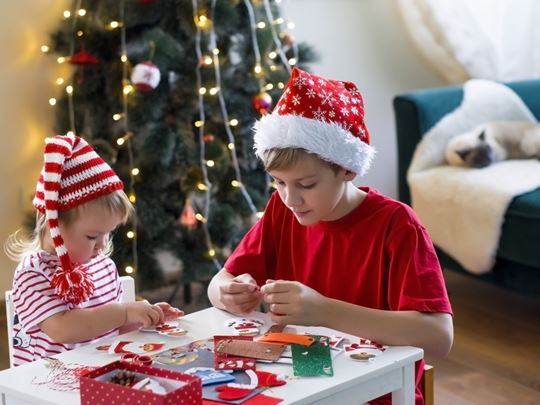Regardless of the type of fostering you provide, you’ll likely celebrate Christmas with a foster child at some point in your fostering journey. You may already have a few ideas up your sleeve, but if you need a little extra guidance, here are our tips to help you prepare for Christmas.
Our top tips on how to prepare for Christmas
Christmas is firmly on the horizon, and you may be visualising beautiful decorations, freshly baked gingerbread men and stockings full of presents. But, when preparing for the first Christmas with your foster child, whose images of Christmas could be very different, there are many things to consider. But we’re here to help you prepare so you’re ready for any challenges that may arise during this magical season.

Recognise the impact of Christmas on your foster child
Christmas, although a joyous time of year for many children, can be incredibly challenging for foster children. If they’ve only recently moved into care, this could be their first Christmas without their family. Christmas could also trigger distressing memories for foster children who’ve experienced difficult family dynamics, abuse and neglect. They also have to navigate the depictions of happy families in Christmas films and questions at school about their Christmas plans.
So, when you’re preparing for Christmas, it’s essential to recognise the impact Christmas could have on your foster child’s well-being. Their emotions may be heightened, and their behaviour could change, so they’ll need your help to guide them through the festive season.
At FCA, our therapists are on hand to support you in understanding the link between your foster child’s behaviour and their past experiences. This will enable you to respond in a therapeutic way throughout the festive period and beyond so they can heal from their trauma.
Ask for their input
Make getting prepared for Christmas a family affair. Including your foster child in the planning will show them that you value their input and want them to feel part of the family. It could also help ease anxiety about what will happen on Christmas day and during the lead-up because they’ll know what to expect. Details you could discuss with your foster child include:
- Traditions: Find out if they hold any Christmas traditions close to their heart and include some in your plans. For example, they may watch the same Christmas movie or attend a carol service every year.
- Food: Let them know what’s usually on the menu at Christmas and see if they have any preferences. They may not be used to a full-on Christmas dinner, selecting a simple alternative instead.
- Decorations: They could help you choose the style, colour and positioning of decorations around the house. They might like to add some festive cheer to their bedroom or keep things very simplistic if it’s triggering.
- Activities: From Christmas arts and crafts to ice skating, give them some activity choices and allow them to select their favourites. This way, you’ll only plan activities they’re comfortable participating in.
- Visitors: If you’re planning to have guests over the Christmas period, check to see if they’re okay with this and ensure they know exactly who’ll be visiting. It may be easier to visit friends and family at their homes instead so you can leave if it gets too much for your foster child.
Stick to their routine
Taking breaks from your usual routine can be refreshing; however, for children in care, a consistent routine can provide stability and a sense of safety. While it might be tempting to disrupt this routine for a couple of weeks, doing so could disorient your foster child and further heighten their emotions.
So, during the Christmas holidays, stick to a familiar routine; for example, continue to have meals at the same time every day and adhere to their usual bedtimes. You could also include activities that are good for your foster child’s well-being, such as nature walks and quiet times where they can read or write their thoughts down in a journal.
Have realistic expectations
If you want to organise lots of festive fun, that’s brilliant, but Christmas can be particularly emotive for your foster child, and even if they say they’re okay with your plans now, they may change their mind later.
It’s important to manage your expectations and be prepared for sudden changes to your plans. When discussing Christmas activities with your foster child, reassure them that it’s okay for them to change their mind. This could help alleviate any worries they may have about disappointing you.
Remember, there is nothing wrong with having a quiet, calm and cosy Christmas. In fact, it could be the perfect opportunity to build a closer bond with your foster child. The main thing is that they feel loved, nurtured, and safe.
Help them prepare for family time
If your foster child has contact arrangements with their family, they may see them over Christmas and want to take some gifts or cards. So, consider going Christmas shopping together or spending an afternoon making festive cards.
After your foster child sees their family, they may need some quiet time to reflect as the reality of not being with them on Christmas Day sinks in. If family time doesn’t go to plan, listen to their experience without judgment while offering comfort and support.
Don’t go overboard on gifts
It can be easy to get carried away when Christmas shopping, especially if you keep finding things you think your foster child would appreciate. However, receiving too many gifts on Christmas day could be overwhelming, and your foster child may not know how to respond. To avoid going overboard, ask your foster child to write a Christmas wish list and focus on purchasing a small number of meaningful presents instead. If you’re struggling with Christmas gift ideas, talk to other foster parents in our community.
Gifts are only a small part of the Christmas experience, and it won’t be long until your foster child outgrows toys, games and clothes. So rather than putting too much pressure on yourself to find the perfect gifts, concentrate on enjoying each other’s company and creating positive memories.
Look after your own well-being
When you’re busy making Christmas plans, it can be easy to overlook your own well-being, and you could end up experiencing burnout. Make an effort to allocate time for yourself, even if it’s just having a nice hot bath every evening or going for a walk on your own. These small things can give you the headspace to organise your thoughts and feel ready to take on the next challenge.
Don’t forget to tap into our support for foster parents. Whether you need guidance, advice, or just a listening ear, your dedicated social worker and our 24/7 helpline are only a phone call away. At FCA, we also host activities throughout the year, so contact your local centre to see what they’ve got planned for Christmas and share your experiences with other foster families.

Foster a child over Christmas
If you don’t already foster and are considering fostering a child or have experience and want to switch to an agency committed to making a real difference in the lives of children, contact us today. At FCA, we provide you with the support, training, and resources you need to give children a happy childhood. Together, we can help children in care build positive memories, including Christmases full of love, laughter and joy.





